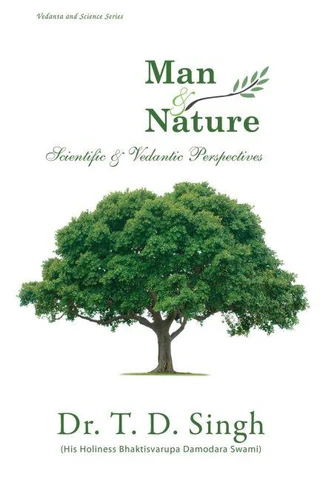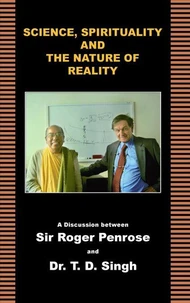Man and Nature - Scientific and Vedantic Perspectives. Vedanta and Science Series
Par :Formats :
Disponible dans votre compte client Decitre ou Furet du Nord dès validation de votre commande. Le format ePub protégé est :
- Compatible avec une lecture sur My Vivlio (smartphone, tablette, ordinateur)
- Compatible avec une lecture sur liseuses Vivlio
- Pour les liseuses autres que Vivlio, vous devez utiliser le logiciel Adobe Digital Edition. Non compatible avec la lecture sur les liseuses Kindle, Remarkable et Sony
- Non compatible avec un achat hors France métropolitaine
 , qui est-ce ?
, qui est-ce ?Notre partenaire de plateforme de lecture numérique où vous retrouverez l'ensemble de vos ebooks gratuitement
Pour en savoir plus sur nos ebooks, consultez notre aide en ligne ici
- FormatePub
- ISBN978-81-89635-41-1
- EAN9788189635411
- Date de parution26/11/2020
- Protection num.Adobe DRM
- Infos supplémentairesepub
- ÉditeurBhaktivedanta Institute, Kolka
Résumé
From the dawn of civilization man has been always interested in the mysteries of nature. But what is nature? What is nature made of? With the advent of scientific revolution from around the sixteenth century, man's thinking about nature took a sharp turn. The ancient view of nature has been dominated by the religious concept that nature is a product of God and one should respect nature and its variegated manifestations.
This was, however, greatly influenced with the development of modern science. Discovery of the gravitational law, the laws of physics and chemistry, and the laws of mechanics, classical as well as quantum, and the laws of genetics, conceiving the big bang theories of the origin of the universe, life and so on have significantly changed man's views about nature. But how far can we mathematize nature? Are there limits to this seemingly ever expanding horizon of unfolding hidden principles of nature? The present volume is a serious attempt to closely reexamine at our evolving views of nature and their limitations.
Taking insights from Vedanta, it further endeavors to grasp the deeper meaning of man's relation with nature. The author, Dr. T. D. Singh, who personally witnessed the evolution of modern science for over half a century, presents some of these remarkable reflections in this volume, accessible easily to scholars and layman alike. The readers, we hope, will find the volume as nourishing and as challenging as ever in our constant and most fascinating quest to comprehend nature.
This was, however, greatly influenced with the development of modern science. Discovery of the gravitational law, the laws of physics and chemistry, and the laws of mechanics, classical as well as quantum, and the laws of genetics, conceiving the big bang theories of the origin of the universe, life and so on have significantly changed man's views about nature. But how far can we mathematize nature? Are there limits to this seemingly ever expanding horizon of unfolding hidden principles of nature? The present volume is a serious attempt to closely reexamine at our evolving views of nature and their limitations.
Taking insights from Vedanta, it further endeavors to grasp the deeper meaning of man's relation with nature. The author, Dr. T. D. Singh, who personally witnessed the evolution of modern science for over half a century, presents some of these remarkable reflections in this volume, accessible easily to scholars and layman alike. The readers, we hope, will find the volume as nourishing and as challenging as ever in our constant and most fascinating quest to comprehend nature.
From the dawn of civilization man has been always interested in the mysteries of nature. But what is nature? What is nature made of? With the advent of scientific revolution from around the sixteenth century, man's thinking about nature took a sharp turn. The ancient view of nature has been dominated by the religious concept that nature is a product of God and one should respect nature and its variegated manifestations.
This was, however, greatly influenced with the development of modern science. Discovery of the gravitational law, the laws of physics and chemistry, and the laws of mechanics, classical as well as quantum, and the laws of genetics, conceiving the big bang theories of the origin of the universe, life and so on have significantly changed man's views about nature. But how far can we mathematize nature? Are there limits to this seemingly ever expanding horizon of unfolding hidden principles of nature? The present volume is a serious attempt to closely reexamine at our evolving views of nature and their limitations.
Taking insights from Vedanta, it further endeavors to grasp the deeper meaning of man's relation with nature. The author, Dr. T. D. Singh, who personally witnessed the evolution of modern science for over half a century, presents some of these remarkable reflections in this volume, accessible easily to scholars and layman alike. The readers, we hope, will find the volume as nourishing and as challenging as ever in our constant and most fascinating quest to comprehend nature.
This was, however, greatly influenced with the development of modern science. Discovery of the gravitational law, the laws of physics and chemistry, and the laws of mechanics, classical as well as quantum, and the laws of genetics, conceiving the big bang theories of the origin of the universe, life and so on have significantly changed man's views about nature. But how far can we mathematize nature? Are there limits to this seemingly ever expanding horizon of unfolding hidden principles of nature? The present volume is a serious attempt to closely reexamine at our evolving views of nature and their limitations.
Taking insights from Vedanta, it further endeavors to grasp the deeper meaning of man's relation with nature. The author, Dr. T. D. Singh, who personally witnessed the evolution of modern science for over half a century, presents some of these remarkable reflections in this volume, accessible easily to scholars and layman alike. The readers, we hope, will find the volume as nourishing and as challenging as ever in our constant and most fascinating quest to comprehend nature.












